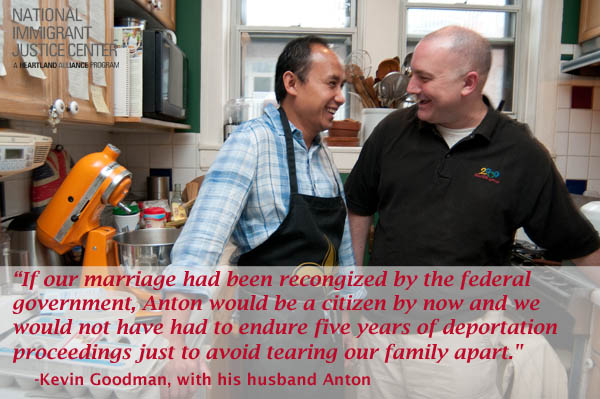This week, many immigration advocates are keeping a close eye on the U.S. Supreme Court as it takes on same-sex marriage. Today were the oral arguments in United States v. Windsor, the case challenging the Defense of Marriage Act. NIJC, for one, is hoping the justices will overturn DOMA, which has a devastating effect on same-sex bi-national couples.
 To give just one of thousands of examples, DOMA prevented Anton, who is Indonesian, and Kevin, a U.S. citizen, from living a normal life in the United States. Despite being married, they constantly feared the U.S. government would rip them apart from one another.
To give just one of thousands of examples, DOMA prevented Anton, who is Indonesian, and Kevin, a U.S. citizen, from living a normal life in the United States. Despite being married, they constantly feared the U.S. government would rip them apart from one another.
Under current immigration law, U.S. citizens and lawful permanent residents who marry foreign nationals of the opposite sex can sponsor their spouses for permanent status in the United States. However, same-sex couples do not have this right because DOMA restricts the federal definition of marriage as being between a man and a woman. While the current immigration system provides few mechanisms through which foreign nationals may gain legal status, many same-sex married couples have no way to legally remain together in the United States.
Anton knew that when his visa expired, he and Kevin would be left with an impossible choice. They could either move to Indonesia, where they feared persecution and would be thousands of miles away from their family and children, or continue their lives in the United States under the constant threat of deportation.
For Anton and Kevin, living in Indonesia was such a frightening prospect it was hardly an option at all. Kevin is a member of the Episcopal clergy and moving Indonesia would have required him to abandon his religious practice. Even though there is a Christian community in Indonesia, the dangers for an openly gay, married, Episcopal man are far too great.
Unlike many other couples, Anton and Kevin never had to make the decision to choose between a life in the shadows in the United States or a life of possible persecution abroad. After years of fighting his immigration case, Anton obtained asylum in the United States.
"I am lucky that my partner had a strong claim for asylum, but I wish we would not have been forced to take that route,” said Kevin. “If our marriage had been recognized by the federal government, Anton would be a citizen by now and we would not have had to endure five years of deportation proceedings just to avoid tearing our family apart."
Unfortunately, for most couples in Anton and Kevin’s situation, there is no other route. There are approximately 36,000 bi-national couples living in the United States, and each of these families has faced a unique struggle as a result of DOMA’s application to the immigration context.
As the supervising attorney of NIJC’s LGBT Immigrant Rights Initiative, my colleague Keren Zwick has met and represented many of these couples. "Making a future with another person is hard enough without having to worry that your husband or wife is going to be deported to another country, especially when it may not be safe to live as an openly gay person in that country,” she said.
If the Supreme Court overturns DOMA, it would be a crucial step to ensuring equality for same-sex bi-national couples. But repealing DOMA is not the only solution. The Uniting American Families Act (UAFA), which Congress has introduced repeatedly, would allow same-sex couples regardless of the nature of their union—civil unions and domestic partnerships included—to stay together in the United States. It is critical that UAFA is a part of comprehensive immigration reform.
Today, Anton and Kevin and the thousands of other LGBT bi-national couples hope the Supreme Court recognizes what Keren does: “It is time for the federal government to step aside and recognize that a marriage is a marriage, no matter who you love.”
Julia Toepfer is the marketing and communications coordinator at Heartland Alliance's National Immigrant Justice Center.
Rethink Immigration is a blog series in which National Immigrant Justice Center staff, clients, and volunteers share their unique perspectives and specific recommendations on what Congress and the Obama administration must include in comprehensive immigration reform to create an inclusive, fair, and humane immigration system.

